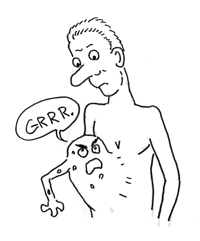A while back I described John Searle’s Chinese Prisoner dilemma which purports to show that computers will never be able to understand meaning as humans do. He argues that computers can trade in the syntax of a statement but not the semantics. So you could present a computer with “2 + 2 = ?” and it would answer “4”, but it would not understand the meaning behind those symbols. (You can read the post for more info on Searle’s idea, or, you know, google it.)
It happens that the book I’m reading, “The Mind’s I” contains the original text of Searle’s argument and the authors’ rebuttal of it. But I’m more interested in some specific commentary on the nature of learning a language. The authors point out that to successfully learn a language you need to hear not the sounds but the meaning. For people who learn a new language…
The sounds of the second language pretty soon become “unheard”—you hear right through them, rather than hearing them… Of course you can make yourself hear a familiar language as pure uninterpreted sound if you try very hard… but you can’t have your cake and eat it too—you can’t hear the sounds both with and without their meanings. And so most of the time people hear mainly meaning.
I was a little perplexed by this point. I am very familiar with english and I don’t don’t think I could force myself to not hear the meaning behind a word. If I hear “dog” I immediately think of a cute, furry creature with a tail; I can’t just hear the phonemes as sounds devoid of meaning. However, I think the authors are really referring to languages we may be familiar with but not masters of: second and third languages. I should try this experiment with both French and German which I dabble in. As it is, I do have a sense that when I hear a foreign word there’s a weird transformation process. If I hear “hund” (German) I think, “hund” = “dog” = a furry canine type creature. I don’t literally think this of course, but I have to translate the word to the english word and then to the concept it represents. Clearly, to speak well, I need to eliminate the middle step and go right from the foreign word to the concept.
So, learning a language is really just getting to the point where the meaning of the word or phrase comes jumping into your consciousness immediately upon hearing/seeing it. This mental word processing needs to be automatic and unconscious. A bit like learning to ride a bike I suppose. At first you have to think about it: move this leg then that leg, holds hands this way, torque body for balance etc. But eventually you don’t think about it at all.
A point that “The Mind’s I” touches on is that we also have meaning for music, though its much harder to define. You might hear a piece of music and “think”, “This is Led Zeppelin’s ‘Black Dog’. Those boys were a crazy hard drinking band from the 70s who epitomized rock and roll excess. I lost my virginity to this song*.” Again, the processing of all this is unconscious. You don’t “do” it, you “experience” it. (And it should be noted that, unlike words, the information evoked when you hear Zep’s ‘Black Dog’ may be far different from mine.)
* I didn’t actually; in fact no music was playing when I lost my virginity. But you might have.
 A while back I was considering an idea for a fiction character. The conceit was that the character had multiple consciousnesses in their brain, but each consciousness generally arrived at the same decisions. So, if this person received a coffee from a waitress, one consciousness might think, “Wow, she sure brought the coffee fast, I better thank her,” while another consciousness might think, “Look at this whore. I bet she thinks by bringing me coffee quickly she’ll get a tip! Oh, well, I better thank her in the interests of conforming to society. Bleg.” In addition, neither consciousness was aware of the other.
A while back I was considering an idea for a fiction character. The conceit was that the character had multiple consciousnesses in their brain, but each consciousness generally arrived at the same decisions. So, if this person received a coffee from a waitress, one consciousness might think, “Wow, she sure brought the coffee fast, I better thank her,” while another consciousness might think, “Look at this whore. I bet she thinks by bringing me coffee quickly she’ll get a tip! Oh, well, I better thank her in the interests of conforming to society. Bleg.” In addition, neither consciousness was aware of the other. You of course might say, “But I only feel that main, traditional consciousness—the one that gets up for work in the morning and and watches late night television at night?” Correct – “you” do, but I’m saying there are many “yous” in your body. It might help to think of those classic horror films where a person has an evil conjoined twin growing out of their body. That twin has no real say about what you (the main consciousness) decides to do, but he sits there, growing out of your chest and stewing in his anger*.
You of course might say, “But I only feel that main, traditional consciousness—the one that gets up for work in the morning and and watches late night television at night?” Correct – “you” do, but I’m saying there are many “yous” in your body. It might help to think of those classic horror films where a person has an evil conjoined twin growing out of their body. That twin has no real say about what you (the main consciousness) decides to do, but he sits there, growing out of your chest and stewing in his anger*.